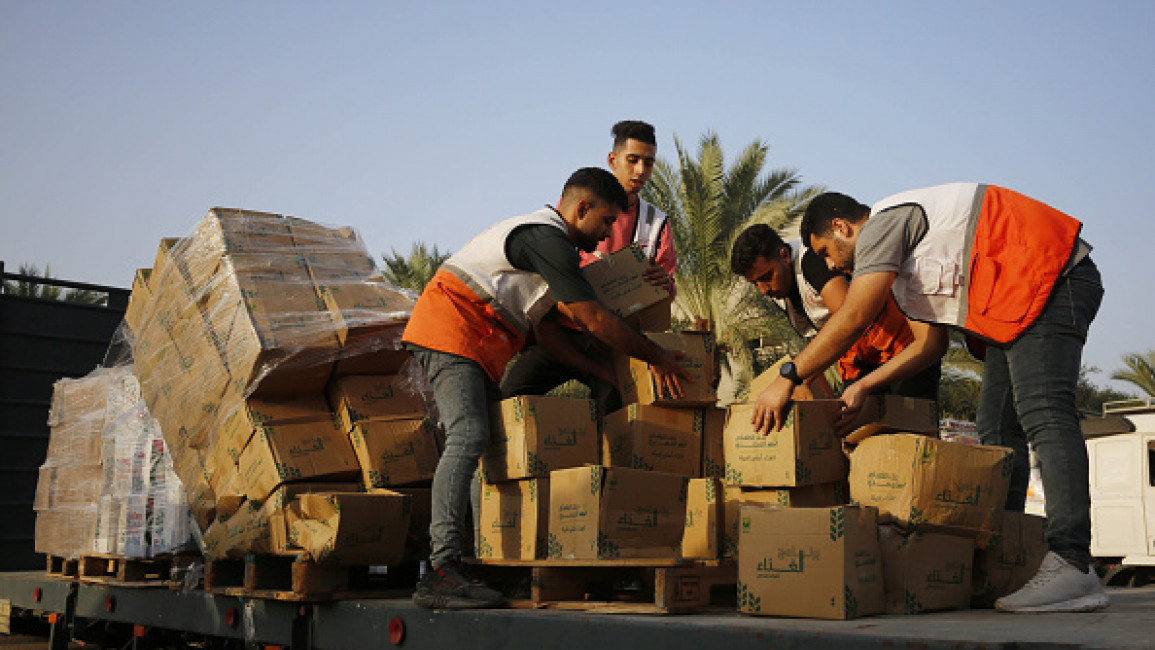’A drop in the ocean’: NGOs in Gaza say aid brought by convoys way short of needs
The amount of aid trickling into Gaza is falling far short of what Palestinians in the devastated enclave need to survive, aid workers have said.
The World Health Organisation (WHO) and local officials have warned that thousands of patients are at risk of death as Gaza's hospitals grind to a halt, and have called for fuel to be allowed in and supplies to be provided to healthcare facilities.
Since Saturday, a total of 54 trucks have entered Gaza – a territory that has already suffered from a 17-year Israeli blockade – through the Rafah crossing with Egypt. The latest convoy, made up of 20 trucks, made its way into Gaza on Monday.
This entry of aid represents a negligibly small break in Israel's total siege on Gaza, imposed after it began to incessantly bomb the enclave in an offensive that has so far killed more than 6,500 Palestinians.
Aid workers say the amount of aid reaching Gaza is only a tiny fraction of what is needed for the 2.3 million people trapped there.
"I would say that 20 trucks in a day is a drop in the ocean, compared to the basic life and urgent medical needs on the ground. And when compared to a normal day (without war), this represents only 4 percent of the daily inputs to Gaza," an aid worker in the enclave told The New Arab.
"I am writing this email while the aid trucks are getting through to Gaza and I can see them, and my 12-year-old niece is saying 'we don’t want aid but a ceasefire'."
Israel has incessantly bombed the Gaza Strip since 7 October, the day Hamas fighters launched a surprise attack on southern Israel and killed around 1,40o Israelis, mostly civilians.
Israel has killed over 6,500 Palestinians, mostly women and children, and injured around 18,000 in its ferocious and indiscriminate retaliation against the Gaza Strip.
The US has reportedly advised Israel to delay an expected ground invasion, urging more time for negotiations to secure the release of hostages held by Hamas.
The ongoing siege and bombardment of Gaza has led to severe shortages of food, water, and medical supplies, particularly for the approximately 1.4 million people displaced in the bombings.
As fuel runs out, Gaza's hospitals are struggling to maintain essential services, life-saving medical equipment, and incubators for premature babies. Doctors in Gaza are reportedly resorting to performing surgeries using phone flashlights due to the critical shortage of fuel for generators.
UN officials have said that at least 100 aid trucks a day are needed to meet the essential needs of Gazans; prior to the total siege, several hundred trucks were arriving in Gaza daily.
The situation at Rafah has worsened with Israel's repeated bombing of the crossing, causing severe damage to infrastructure.
Palestinian journalist Rushdi Sarraj was killed in an Israeli airstrike on his home in Gaza on Sunday.
— The New Arab (@The_NewArab) October 23, 2023
The co-founder of Ain Media is the 19th Palestinian journalist killed since Israel began its brutal and relentless bombardment of the Gaza Strip just over two weeks ago 👇 pic.twitter.com/hZHpu3Mfl9
Aid workers are also frustrated by the lack of critical coverage regarding the queue of trucks on the Egypt side of the border waiting for permission from Israel for entry to Gaza.
Last week, Egyptian NGO volunteer Rahma Zein passionately confronted a CNN reporter at Rafah over the broadcaster's coverage of the humanitarian disaster caused by Israel.
"There’s an abundance of supplies... Egyptians are trying to send, people from the region are trying to send (supplies). The issue is the Israelis are not opening the borders to send over these supplies," Zein, a volunteer for The Food Bank, said.
"They're playing this game, they're trying to really hit hard on the Palestinians. It’s demonic. And at the same time, they have bombed the part between the Rafah crossing and Gaza, so that even once they do open these big trucks, these hundreds of trucks are not going to be able to go in with ease."



